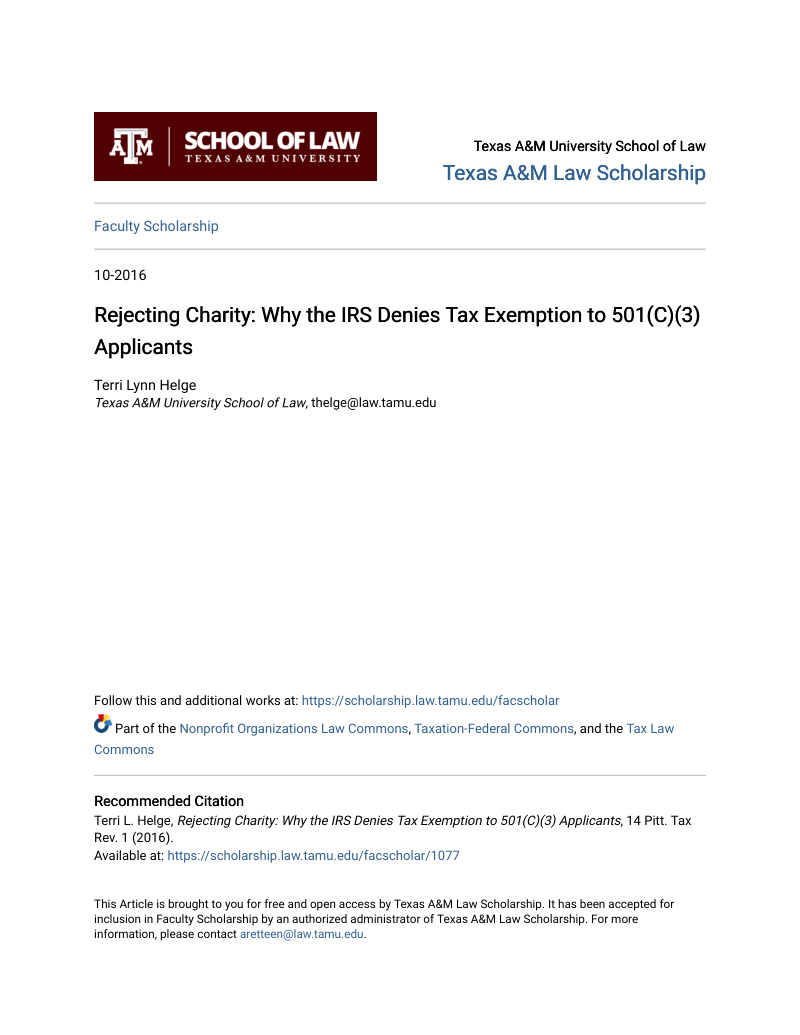Terri Lynn Helge of Texas A&M University School of Law summarizes requirements and tests for tax-exempt organizations.
- Type
- Academic / Technical Report
- Source
- Terri Lynn Helge Non-LDS
- Hearsay
- Secondary
- Reference
Terri Lynn Helge, "Rejecting Charity: Why the IRS Denies Tax Exemption to 501(C)(3) Applicants," Texas A&M University School of Law, 2016
- Scribe/Publisher
- Texas A&M University School of Law
- People
- Terri Lynn Helge
- Audience
- Reading Public
- Transcription
INTRODUCTION
The Internal Revenue Service (Service) is charged with the oversight of tax-exempt charitable organizations.' As part of this oversight, new charitable organizations generally must file an application for exemption (Form 1023) and await approval from the Service. The Service approves of the organization's charitable status under Section 501(c)(3) by issuing a determination letter to the organization. This determination by the Service not only exempts the charitable organization from federal income tax but also enables the charitable organization to receive tax-deductible charitable contributions from donors. Furthermore, many state exemptions, such as exemption from income tax, sales tax, and property tax, rely at least in part on a determination from the Service that the organization qualifies as a charitable organization described in Section 501(c)(3). Accordingly, the Service serves a role as an important gatekeeper to determine which applicants qualify as "charitable" and deserving of these special privileges.
Unfortunately, the criteria the Service uses to evaluate applications has not always been transparent. If an application is approved, the Service determination letter and the application for exemption are required to be made publicly available and can be requested from the Service or the organization itself. However, the determination letter does not set forth the reasons why the organization's application was approved but instead only states that the organization qualifies for exemption, the effective date of the exemption, and the organization's classification as a public charity or private foundation.
Prior to 2004, in the case of denials, neither the application nor the Service's correspondence setting forth its rationale for the denial were made publicly available. In December 2003, the District of Columbia Circuit Court ruled that the Service was required to make these denial letters publicly available. ' As a result, the Service started releasing these letters in 2004 with the identifying information of the applicants redacted.'' These denial letters provide an important source of information about the criteria the Service uses to evaluate charitable organization exemption applications.
This project is the first of its kind. While others have commented on isolated denial letters,'2 this study is the first to conduct a comprehensive analysis of the Service denial letters issued from when they first became available in 2004 through January 31, 2017. In conducting this project, I examined 603 determination letters in which the Service denied exemption to an applicant seeking recognition as charitable organizations described in Section 501(c)(3). This project looks in-depth at the basis on which the Service denied exemption to these applicants.
- Citations in Mormonr Qnas
The B. H. Roberts Foundation is not owned by, operated by, or affiliated with the Church of Jesus Christ of Latter-day Saints.

